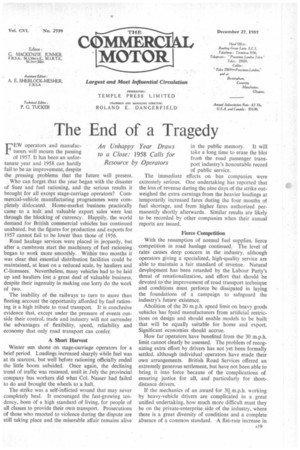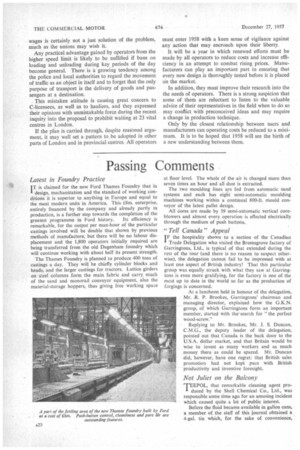The End of a Tragedy
Page 21

Page 22

If you've noticed an error in this article please click here to report it so we can fix it.
An Unhappy Year Draws to a Close: 1958 Calls for Resource by Operators FEW operators and manufacturers will mourn the passing of 1957. It has been an unfortunate year and 1958 can hardly fail to be an improvement, despite the pressing problems that the future will present.
Who can forget that the year began with the disaster of Suez and fuel rationing, and the serious results it brought for all except stage-carriage operators? Commercial-vehicle manufacturing programmes were completely dislocated. Home-market business practically came to a halt and valuable export sales were lost through the blocking of currency. Happily, the world demand for British commercial vehicles has continued unabated, but the figures for production and exports for 1957 cannot fail to be lower.than those of 1956.
Road haulage services were placed in jeopardy, but after a cumbrous start the machinery of fuel rationing began to work more smoothly. Within two months it was clear that essential diStribution facilities could be maintained, at least on a reduced scale, by hauliers and , C-licensees. Nevertheless, many vehicles had to be laid up and hauliers lost a great deal of valuable business, despite their ingenuity in making one lorry do the work of two.
The inability of the railways to turn to more than fleeting account the opportunity afforded by fuel rationing is a high tribute to road transport. It is conclusive evidence that, except under the pressure of events outside their control, trade and industry will not surrender the advantages of flexibility, speed, reliability and economy that only road transport can confer.
A Short Harvest Winter sun shone on stage-carriage operators for a brief period. Loadings increased sharply while fuel was at its scarcest, but well before rationing officially ended the little boom subsided. Once again, the declining trend of traffic was resumed, until in July the provincial company bus workers did what Col. Nasser had failed to do and brought the wheels to a halt.
The strike was a self-inflicted wound that may never completely heal. It encouraged the fast-growing tendency, born of a high standard of living, for people of all classes to provide their own transport. Prosecutions of those who resorted to violence during the dispute are still taking place and the miserable affair remains alive in the public memory. It will take a long time to erase the blot from the road passenger transport industry's honourable record of public service.
The immediate effects on bus companies were extremely serious. One undertaking has reported that the loss of revenue during the nine days of the strike outweighed the extra earnings from the heavier loadings at temporarily increased fares during the four months of fuel shortage, and from higher fares authorized permanently shortly afterwards. Similar results are likely to be recorded by other companies when their annual reports are issued.
Fierce Competition With the resumption of normal fuel supplies, fierce competition in road haulage continued. The level of rates causes deep concern in the industry, although operators giving a specialized, high-quality service are able to maintain a fair standard of revenue. Natural development has been retarded by the Labour Party's threat of renationalization, and effort that should be devoted to the improvement of road transport technique and conditions must perforce be dissipated in laying the foundations of a campaign to safeguard the industry's future existence.
Abolition of the 20 m.p.h. speed limit on heavy goods vehicles has freed manufacturers from artificial restrictions on design and should enable models to be built that will be equally suitable for home and export. Significant economies should accrue.
How far operators have benefited from the 30 m.p.h. limit cannot clearly be assessed. The problem of recognizing extra effort by drivers has not yet been formally settled, although individual operators have made their own arrangements. British Road Services offered an extremely generous settlement, but have not been able to bring, it into force because of the complications of ensuring justice for all, and particularly for shortdistance drivers.
If the mechanics of an award for 30 m.p.h. working by heavy-vehicle drivers are complicated in a great unified undertaking, how much more difficult must they be on the private-enterprise side of the industry, where there is a great diversity of conditions and a complete absence of a common standard. A flat-rate increase in wages is certainly not a just solution of the problem, much as the unions may wish it.
Any practical advantage gained by operators from the higher speed limit is likely to be nullified if bans on loading and unloading during key periods of the day become general. There is a growing tendency among the police and local authorities to regard the movement of traffic as an object in itself and to forget that the only purpose of transport is the delivery of goods and passengers at a destination.
This mistaken attitude is causing great concern to C-licensees, as well as to hauliers, and they expressed their opinions with unmistakable force during the recent inquiry into the proposal to prohibit waiting at 23 vital centres in London.
If the plan is carried through, despite reasoned argument, it may well set a pattern to be adopted in other parts of London and in provincial centres. All operators must enter 1958 with a keen sense of vigilance against any action that may encroach upon their liberty.
It will be a year in which renewed efforts must be made by all operators to reduce costs and increase efficiency in an attempt to combat rising prices. Manufacturers can play an important part in ensuring that every new design is thoroughly tested before it is placed on the market.
In addition, they must improve their research into the the needs of operators. There is a strong suspicion that some of them are reluctant to listen to the valuable advice of their representatives in the field when to do so may conflict with preconceived ideas and may require a change in production technique.
Only by the closest relationship between users and manufacturers can operating costs be reduced to a minimum. It is to be hoped that 1958 will see the birth of a new understanding between them.




















































































